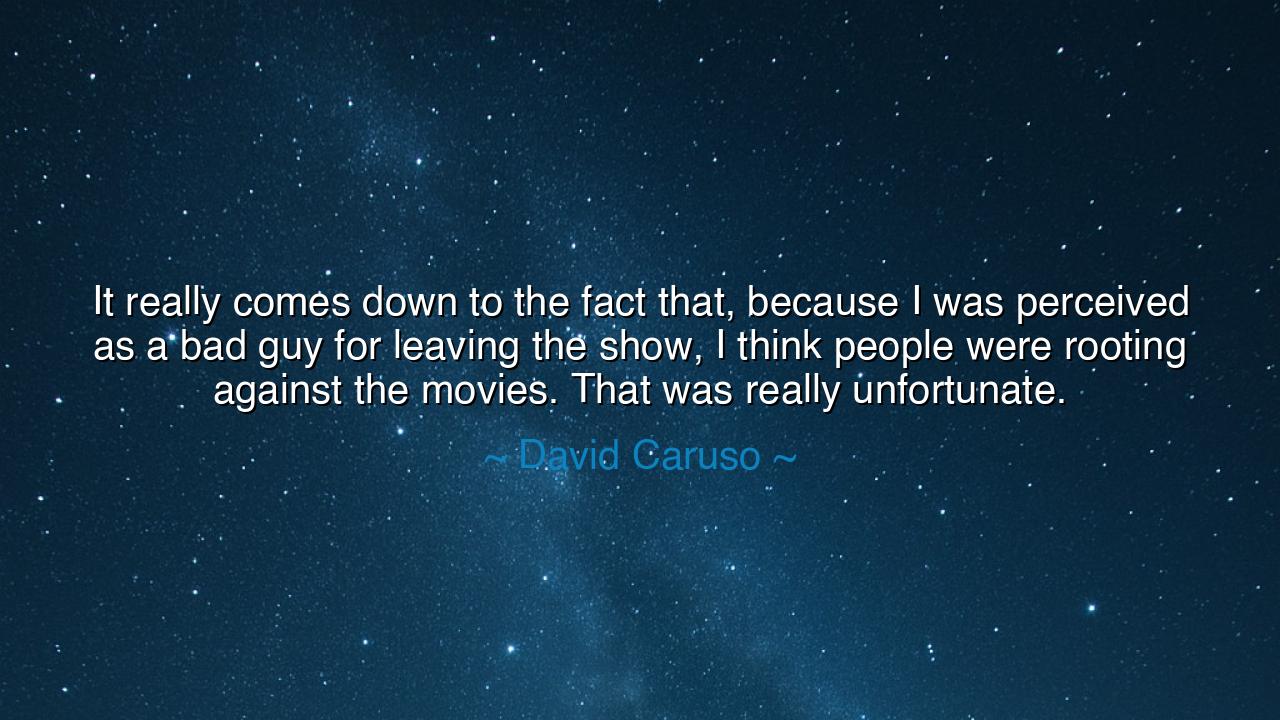
It really comes down to the fact that, because I was perceived
It really comes down to the fact that, because I was perceived as a bad guy for leaving the show, I think people were rooting against the movies. That was really unfortunate.






Hear now, O children of the future, the words of David Caruso, a man who has known the sting of public judgment. He said, "It really comes down to the fact that, because I was perceived as a bad guy for leaving the show, I think people were rooting against the movies. That was really unfortunate." In these words, Caruso speaks of a painful truth, one that resonates through time and echoes the very nature of public perception and personal choices. He reveals the subtle and often unforgiving ways in which the world judges those who make decisions that others do not understand.
When Caruso left the hit television show that had brought him fame, he made a choice that was, in his eyes, a path toward personal growth or new opportunities. But to the masses, this departure marked him as a traitor, someone who had abandoned a cherished part of their lives for reasons they could not comprehend. In this, Caruso’s experience mirrors that of many who have dared to step outside the expectations of the world. For in every society, there is an invisible thread that binds the individual to the collective, and when one dares to sever that thread, they are often met with scorn, misunderstanding, and sometimes, resentment.
Consider, O seekers of wisdom, the tale of Julius Caesar, the great Roman general who faced similar challenges. As he returned to Rome, victorious in battle, he was hailed as a hero by some and viewed with suspicion by others. His decision to cross the Rubicon, to take power into his own hands, was seen as a betrayal of the Roman Republic. Many of his fellow countrymen rooted against him, believing he sought to bring ruin to their way of life. Caesar’s choice, though driven by his belief in his own vision, placed him in opposition to the very people he had once served. In the end, he became a symbol of the danger inherent in stepping outside the expected, a tragic reminder that greatness often brings with it the bitterness of betrayal in the eyes of others.
In the same vein, Caruso’s departure from his popular role created a ripple of judgment, as if by leaving, he had betrayed not only the show but the very audience who had supported him. Public opinion, fickle and swift, tends to turn on those who choose their own path, especially when that path diverges from what others expect. It is a bitter truth that the world, in its vastness, is often more comfortable with conformity than with change. And when one dares to stray from the familiar, even for noble reasons, the criticism can be swift and harsh. Caruso felt this in his core, as his decision was not just seen as personal, but as an affront to the very identity the audience had constructed around him.
Yet, O children, let this be a lesson for you: in life, you will face moments when you must make difficult decisions, when your heart tells you to take a path that others may not understand. In those moments, remember the wisdom of the ages: choose courage over conformity. The path you walk is your own, and while others may criticize or question your choices, it is your journey that matters most. The world will always be quick to judge, but it is your spirit, your strength, and your integrity that must guide you forward, not the whims of public opinion.
Consider the story of Socrates, who, too, faced the wrath of society for his beliefs and actions. He was condemned by the people of Athens for challenging the status quo, for questioning the very foundations of their understanding. Yet, Socrates stood firm in his principles, knowing that true wisdom lies not in the acceptance of the masses, but in the pursuit of truth. He did not bend to the pressure of the collective, and in doing so, he left behind a legacy that has endured through the centuries. So, too, must you find the strength to stand in your truth, even when the world does not understand.
Let Caruso’s words remind you of this eternal truth: the courage to make your own choices often comes with the price of misunderstanding and rejection. Yet those who persevere, those who remain true to themselves, will find that the judgment of others is but a passing storm. In time, their choices will be seen for what they truly are—not acts of betrayal, but acts of self-determination and growth. The world may root against you, may doubt your vision, but you are the master of your own fate.
So, O children, walk boldly in the direction your heart calls you to. Do not be swayed by the noise of the crowd, nor by the judgment of those who may never understand. The path of greatness is often lonely, and the choices that lead to it are often misunderstood. But take courage, for in your strength, in your integrity, you will find a way to overcome the scorn of others and shape your own destiny. And in the end, it is not the approval of the crowd that matters, but the fulfillment of your own spirit.






AAdministratorAdministrator
Welcome, honored guests. Please leave a comment, we will respond soon